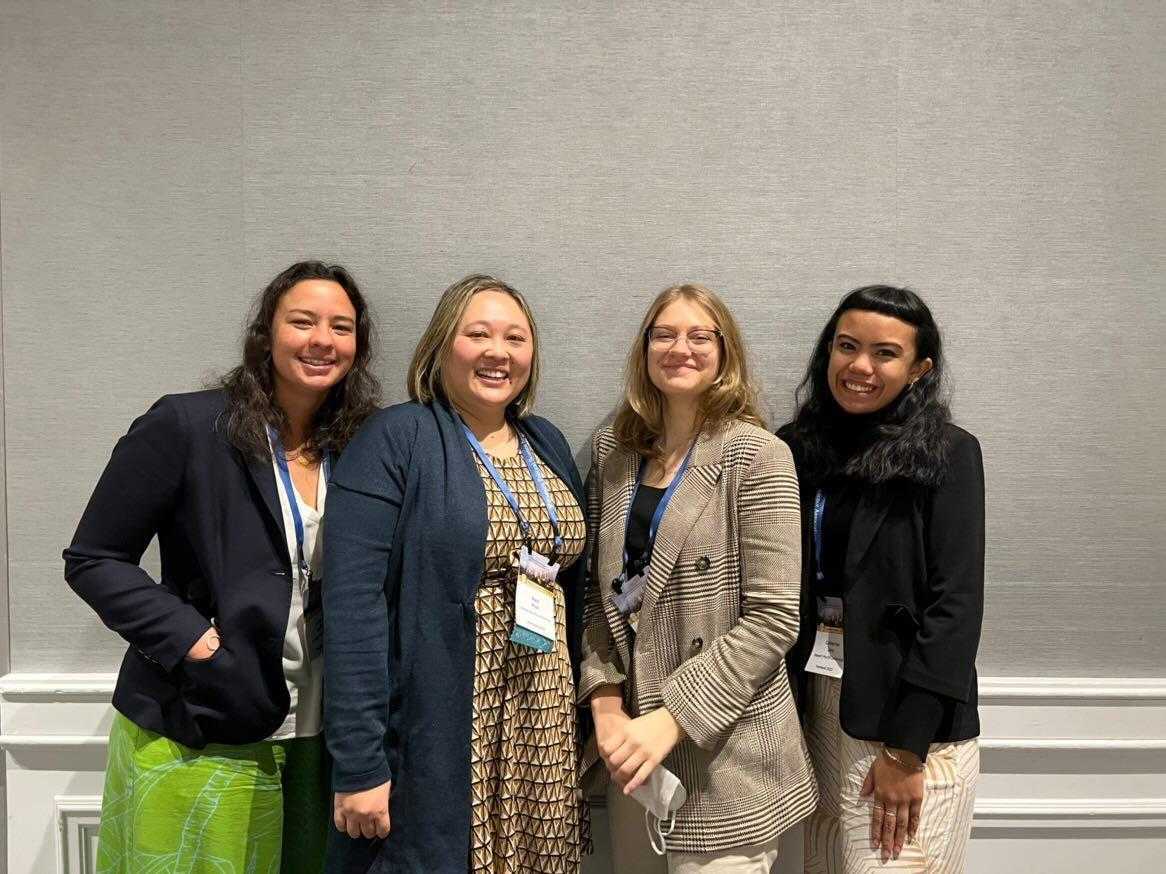
Pictured are HPU researchers represented at the 2022 Western Political Science Association conference, including Laʻakea Dedrick (’21), Ngoc Phan, Ph.D., Leilani DeLude (’20), and Catherine Jara (’22).
In a pioneering study shedding light on Native Hawaiian perspectives concerning the Thirty Meter Telescope (TMT) project, researchers from Hawaiʻi Pacific University have uncovered significant findings that challenge previous assessments. Led by HPU Associate Professor of Political Science Ngoc T. Phan, Ph.D., and assisted by Leilani DeLude, a former undergraduate student (BA International Studies, minor in Spanish ’20) turned graduate researcher, the study delved deep into the nuances of Native Hawaiian opinions. The findings, published in a new academic research article titled “Aloha' aina in action: Native Hawaiian attitudes towards the building of the thirty-meter telescope (TMT) on Maunakea," underscores the critical need for understanding and incorporating Native Hawaiian preferences in decision-making processes related to the Thirty Meter Telescope project on Maunakea. Phan emphasized that existing surveys failed to capture the true sentiment of Native Hawaiians due to methodological limitations, prompting the need for a more targeted approach.
“I noticed the lack of research on Native Hawaiian public opinion when I started my job at HPU seven years ago,” Phan explained. “Current public opinion research misses the mark on understanding what Native Hawaiians really think about issues like TMT. Using voter data skews the results since Native Hawaiians are underrepresented. Even supposedly 'scientific' polls fall short because they still under-sample Native Hawaiians.”
The groundbreaking aspect of the study lies in its original data collection methodology. Collaborating with Native Hawaiian scholar Lynette Cruz, Ph.D., HPU Kupuna in Residence and retired anthropology professor, and a team of undergraduate researchers, Phan and DeLude designed a survey exclusively focused on Native Hawaiian identity and public opinion. The survey, conducted between August 2019 and December 2019, gathered responses from over 1,000 individuals of Hawaiian ancestry across different islands.
“As Kānaka Maoli, it seemed obvious to me that the support against TMT was so high,” said DeLude. “I found the research interesting in that it explored such a large spectrum of Hawaiian identity.”
The findings of the study revealed a stark contrast to previous polls. An overwhelming 87.79% of Native Hawaiian respondents expressed opposition to the TMT project on Maunakea. This figure significantly diverged from earlier polls, which suggested comparatively lower levels of opposition among Hawaiian respondents. The discrepancy underscores the importance of community-specific research methodologies in gauging public sentiment accurately.
Reflecting on her involvement in the project, DeLude shared her journey from being an undergraduate student to a crucial contributor to the research. Initially drawn to the project through her capstone class with Phan, DeLude's involvement grew as she undertook various tasks, including data entry and analysis. The experience not only deepened her understanding of research
methodologies but also ignited her passion for political science, shaping her academic trajectory towards indigenous politics.
“I’m currently in my second year of a Ph.D. program at the University of New Mexico,” she explained. “I would have never become a political scientist had it not been for this project. It definitely shifted my focus towards research.”
In addition to its personal effect on DeLude, she also emphasized the research’s importance on lawmakers in listening to community voices and integrating their perspectives into policymaking processes. Additionally, she underscored the significance of transparent and culturally sensitive research methodologies in accurately representing diverse communities' viewpoints.
“I think there is a perception that it’s hard to get Native Hawaiians to participate in a project like this one,” said DeLude. “But you have to meet them where they are to involve them in the process. That’s what was so successful about this research.”
The findings not only provide valuable insights into Native Hawaiian perspectives on the TMT project but also underscore the broader implications of community-centric research methodologies in shaping equitable and informed policymaking processes. As the debate surrounding the TMT project continues, the voices and perspectives uncovered in this study serve as a crucial catalyst for fostering meaningful dialogue and understanding among stakeholders.
“They also pose a crucial question: why the stark contrast between prior polls and the Native Hawaiian Survey? To bridge this gap, we must bolster scholarship on Native Hawaiian public opinion,” said Phan.


